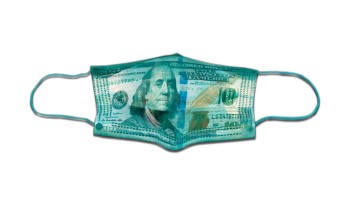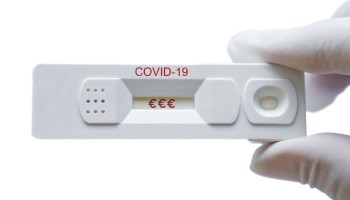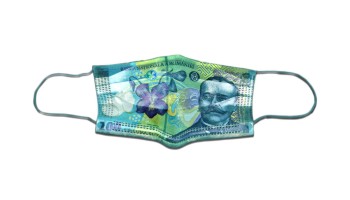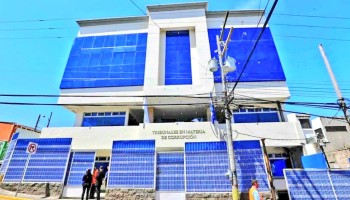It was early July when David Velásquez, then 29, started to feel the aches and fever that made him suspect he had caught COVID-19. His brother, José, rushed him to one of Honduras’ emergency centers for virus testing and treatment, but all he found was chaos.
“The disorganization was tremendous,” recalls José from his home in Honduras’ capital, Tegucigalpa. “They should have prioritized taking patients who were more ill or had symptoms to the emergency room, not putting all of them in the same line.”
Days later, David's health worsened and his doctor said he needed to go to the emergency room, but the hospitals his family contacted were full. One private hospital had space for him but wanted over US$24,000 to admit him and put him on a ventilator — far more than they could afford.
David was forced to stay at home. Luckily, the doctor who was treating him found an oxygen tank to keep him alive. Some of his neighbors weren’t so fortunate.
At that time, the pandemic was already squeezing Honduras' precarious healthcare system. Before COVID-19, this Central American country of 9.3 million had less than one hospital bed per thousand people, one of the worst rates in Latin America. In early July, more than 20,000 people were infected and local media reported that hospitals were overwhelmed.
This was a situation that the government of Honduras had tried to avoid. After the first coronavirus cases in the country were detected in mid-March, the government spent millions on seven mobile hospitals. Marco Bográn, the then-executive director of Inversión Estratégica de Honduras (INVEST-H), which was tasked with the emergency procurement, said the goal was to add more than 450 beds to the hospital system, increasing the Ministry of Health’s capacity fivefold.
Many articles, audits, and reports have been written about Honduras’ disastrous — and possibly illegal — procurement process for the mobile hospitals. Now, OCCRP and Honduran outlet El Pulso can reveal how it played out behind the scenes: INVEST-H chose an apparently unknown company it found on the internet and paid out a vastly inflated fee of $47 million for the hospitals without even signing a contract. Confidential documents show a middleman hiked the price by at least $16 million while delivering equipment that was useless for the task — and months late.
New documents also show that the U.S. company lied about where it was getting the equipment from, and demanded strict confidentiality and control over the proceedings.
It took six months for the first two mobile hospitals to arrive. Both turned up in poor condition and without the ventilators necessary to treat people with severe coronavirus symptoms. The next two arrived only on October 11.
"Nobody knows what they have,” Dr. Carlos Umaña, of the Medical Association of the Honduran Institute of Social Security, said of the first two units. “The facilities are not for intensive care. They are definitely triage hospitals, and they sold it as if they were for intensive care hospitals.”
The man behind the deal, Axel G. López, is hard to find. Reporters tried to contact him for months, but to no avail. After disappearing for several weeks, he’s now apparently in the process of building the new hospitals. It’s unclear when they will be ready.
Mr. HispanoPreneur™
López, 59, is originally from Guatemala. The introduction to his self-published book from 2014 describes how he was kidnapped as a teenager by a group of Mexicans while trying to enter the United States. Once his family in Los Angeles had paid a ransom, it says, he was handed over to a “coyote,” who smuggled him across the border in a hidden compartment in the back of a truck.
After graduating from college in Los Angeles, he got married and enlisted in the U.S. Navy. López left the service five years later, moved with his family to Orlando, Florida, and went into business. He started out in sales, including selling medical equipment, before opening his own company. López claims to have had many nicknames praising his business prowess over the years, including “Mr. Cash King” and “The Hispanic Guru.” Today, he goes by Mr. HispanoPreneur™ and advertises himself as an expert in marketing and business consulting in Latin America.
In his book, titled “How to Do Successful Business in Latin America,” López distills what he has learned over two decades of experience. His secrets of success in Latin America include cozying up to local political and business elites and paying bribes when necessary — though he recommends getting someone else to do that for you.
Business Tips from Mr. Cash King
Reporters found seven U.S. companies connected to López, all but one registered at the same address, and three of which have partners in Turkey with virtually the same name: Vertisa Medical Waste Technology, DLR Medikal, and Elmed Medical Systems.
It was the last of these that the Honduran government picked to supply its mobile hospitals.
Elmed’s official address is a mailbox in a UPS store in a mall in Orlando, Florida. Although Elmed’s website states it offers “mobile hospitals, clinics and mobile solutions,” trade data show it has no history of selling these types of products.
Bográn, the former executive director of INVEST-H, said he found the company by surfing the internet. He said Elmed, which operates under the business name “HospitalesMoviles.com (Mobile Hospitals USA),” was the only company that promised to supply the equipment they needed.
But other evidence indicates López may have stuck to his playbook and used political contacts to seal the deal. For one, he told a local newspaper that the Honduran Embassy in the U.S. had sent information about his company to Honduras.
An old photograph, circulating on social media, also appears to show that the Guatemalan-American entrepreneur had personal contact with the Bográn family in the past.
It depicts López alongside Marco Bográn’s aunt, María Antonieta Guillén de Bográn, who was Honduras’ vice president from 2010 to 2014.
Both Marco Bográn and María Antonieta Guillén de Bográn told local media they have no ties to López. María Dolores Agüero, who was Honduras’ ambassador in Washington until a few weeks ago, also denied having any contact with him.
‘Life-Threatening’ Failures
INVEST-H began its search for mobile hospitals in March, as COVID-19 was fast spreading around the world. Spokesperson Sireya Diaz said the body turned to the international market only after an exhaustive search for a local supplier.
But a scathing report from Transparency International's chapter in Honduras, Asociación para una Sociedad más Justa (ASJ), found INVEST-H conducted no proper bidding process and only emailed several companies seeking information on mobile hospitals.
The report questions why the agency chose Elmed, pointing out that it almost immediately sent a purchase order for the first two hospitals, even as other potential suppliers were still making inquiries about specifications.
It concludes INVEST-H “has not adequately performed its role of transparently and effectively managing the responsibility of using the more than $80 million invested in responding to the COVID-19 pandemic.” This failure, it warns, “could risk the lives of millions of Hondurans."
A separate report by ASJ’s anti-corruption center found INVEST-H did not follow its own contracting guidelines for emergency COVID-19 purchases.
Bográn told Honduras’ National Congress that the purchases had been made without the approval of INVEST-H's board of directors due to the state of emergency. He was arrested this month on charges of misappropriating public funds.
A document obtained by OCCRP and El Pulso shows that López’s company sent INVEST-H confirmation of their purchase of two mobile hospitals on March 18. The same day, he sent a business proposal to Turkish company SDI Global LLC, a military supplier that makes everything from weapons to healthcare equipment. The message was confusingly written, but López appeared to have believed he had placed an order.
López expected strict confidentiality, demanding SDI Global not give information to anyone “UNLESS YOU CLEARED WITH ME DIRECTLY.” He also insisted the mobile hospitals should feature HospitalesMoviles.com’s branding, and not SDI Global’s.
By taking part in this deal, López said, “YOU and Business Partners agree, at a later time, date to be determined in visit to Turkey and meeting among us, and with the interest of foreging (sic.) a stronger agreement will agree to form a NEW company with our current marketing name.”
SDI Global apparently didn’t respond. Six days later, López sent them another message. The company finally got back to him on March 26, when director Göktuğ Luay Humud sent a financial proposal asking for more information. López never confirmed, and no contract was drawn up.
But López had already committed to supplying the mobile hospitals to Honduras. On the same day he received the order from INVEST-H — and before hearing from SDI Global — he sent them a bill for $15.9 million. A second bill for $31.5 million followed a couple of weeks later.
INVEST-H paid these two bills, totalling over $47 million, into Elmed’s account at Chase Bank in the U.S. on March 20 and April 2. The transfers were made without any guarantees or agreements on penalties for late deliveries. An email shows that INVEST-H only asked López for key documents proving Elmed existed one day before the first payment was made.
Bográn defended the decision to pay Elmed more than $47 million with few questions asked, saying it was necessary due to the scramble for medical supplies amid a serious global emergency.
“In this moment of international emergency, the market is dictating the rules of the game,” he told El Pulso in May. “If we want to obtain the supplies, we have to adapt to this new reality of a volatile and erratic market.”
In June, SDI Global denied it had any relationship with Elmed, which it said had created a “fake proposal” using their codes that identify military suppliers and “illegally used our leaflet with photos and description of our products.” Michael Murphy, its chairman, said complaints had been filed against López with the FBI and U.S. Treasury, as well as in Turkey, but did not give more details.
Overinflated Prices
A few weeks after making the payment, Bográn confidently assured El Pulso that the mobile hospitals were under construction and he was in regular contact with the manufacturer, which he thought was run by López.
"The factory belongs directly to them and we have spoken directly with them, with the president of the company while he is in the factory in Turkey," Bográn said at the time. “He is informing us about the progress of the construction every three days.”
In reality, Elmed was just a middleman, if that, as López made clear in the agreement he sent to SDI Global seeking to subcontract out the manufacture of the hospitals. But the HispanoPreneur™ does appear to have played a big role role in pushing up the cost of the deal.
A document seen by El Pulso and OCCRP gives a breakdown of the profits López stood to make. In it, he pushes for SDI Global to cut the price of a 91-bed unit from $5.25 million to $4.45 million and of a 51-bed hospital from $3.7 million to $3.175 million.
On his invoices to INVEST-H, however, López charges $7.95 million for a 91-bed unit and $5.75 million for a 51-bed unit. Based on those figures, Honduras’ government overpaid by over 50 percent, or more than $16 million.
Others have concluded that Honduras overpaid even more.
ASJ contacted two Turkish companies making the same or similar mobile hospitals and received quotes of $2 to 3 million lower per unit than what Honduras paid. Applying similar figures, the Honduran National Anti-Corruption Council estimated that the state paid 69 percent more than it should have, allowing López’s company to earn a commission of over $32.5 million.
"The intermediary falsified tax documents in order to balance the amounts received by Invest-H,” the council wrote in its report. “Such action constitutes a crime of a transnational nature."
Honduras’ former president, Lobo Sosa, said his successor, President Juan Orlando Hernández, would definitely have been aware of the purchase.
“There is no way that he did not know what was going to be done,” Lobo Sosa said. “They could not authorize that money being given without him authorizing it.”
Government spokespeople did not respond to requests for comment.
Old, Used, and Broken
It’s not entirely clear where — or when — the two mobile hospitals that Honduras received in July were actually made. They arrived almost four months after they were purchased, well over the estimated delivery time López had promised.
Inspections conducted by the Public Ministry and the CNA found the units appeared to be second-hand and visibly damaged and corroded in places, according to the Honduran news outlet La Prensa. An official audit of the hospitals found they were missing 61 ventilators needed to treat patients with severe COVID-19 symptoms, while a list of equipment seen by reporters confirms none were delivered with the units.
The audit, published on October 8, also said the hospitals had not been set up, in part because the technicians who were meant to install them never arrived.
INVEST-H is still working with López and has released images showing the remainder of the hospitals are being made by a Turkish company called Vertisa Cevre Tek.
That company also has ties to López: It lists his Florida-based company Vertisa Medical Waste Technology, LLC, as a U.S. distributor, and in an undated post on a local business forum López is quoted as saying the two companies had partnered to form VERTISA Medical Waste Technology.com.
OCCRP tried to contact Vertisa Cevre Tek’s CEO, but got no answer.
López himself keeps disappearing. El Pulso and OCCRP have been trying to reach him since late May but he has not responded to messages or answered calls. Even INVEST-H was unable to reach him for several weeks over the summer.
“I ask you to keep us informed if possible every 3 to 5 days and if there is any kind of evidence you can send us that all this is really happening,” the body’s interim director, Evelyn Bautista, wrote in an email on July 13.
López finally reappeared in August, when INVEST-H released a statement saying Elmed was in the process of constructing the remaining hospitals, accompanied by pictures apparently showing them being made in the factory. In a press release issued at the same time, López apologized for the delays and promised they would be finished by the end of that month.
Two more hospitals reached Honduras in October, but, at the time of publication, three had still not arrived. A report by an INVEST-H commission that visited the factory in Turkey listed 57 separate issues with the units, including bad odors, improper programming of door sensors, and accumulation of water on their roofs. Inspectors have reportedly also found problems with the two which reached Honduras this month, although they have not yet released details.
José Gustavo Boquín, a member of a board tasked with temporarily managing INVEST-H, said they had decided “to accelerate the pace and support the provider in all possible steps so that he can fulfill the delivery of the hospitals as quickly as possible.”
Bográn resigned from his post in late June. He was arrested this month on charges of misappropriation of public funds over accusations he and four other INVEST-H employees spent more than $4,000 quarantining in a luxury hotel for 15 days. Another warrant for his arrest was issued shortly afterwards, this one for allegedly awarding his uncle a contract to supervise building work on the site where one of the mobile hospitals would be placed.
David, the young man infected with COVID-19, recovered at home, which his brother said was thanks to the Herculean efforts of his doctor and the prayers of his family. But he has been left with a lung condition that makes him tire easily.
When asked about the disastrous purchase of mobile hospitals, José said, “The guys who did that and thought of that have no forgiveness from God, playing with the health of human beings.”
Kelly Bloss (OCCRP) and Nelfi Fernandez (El Deber) contributed reporting.











